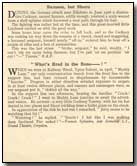Memoirs & Diaries - The Best 500 Cockney War Stories - Samson, But Shorn and Other Stories
 Published in London
in 1921, The Best 500 Cockney War Stories
comprised, in the words of its newspaper publisher (The London Evening
News) "a remembering and retelling of those war days when laughter
sometimes saved men's reason".
Published in London
in 1921, The Best 500 Cockney War Stories
comprised, in the words of its newspaper publisher (The London Evening
News) "a remembering and retelling of those war days when laughter
sometimes saved men's reason".
The collection of short memoirs, some 500 in total, is divided into five categories - Action, Lull, Hospital, High Seas and Here and There. This page contains five stories from Action, led by Samson, but Shorn.
Other sections within the collection can be accessed using the sidebar to the right.
Samson, but Shorn
During the German attack near Zillebeke in June 1916 a diminutive Cockney, named Samson, oddly enough, received a scalp wound from a shell splinter which furrowed a neat path through his hair.
The fighting was rather hot at the time, and this great-hearted little Londoner carried on with the good work.
Some hours later came the order to fall back, and as the Cockney was making his way down the remains of a trench, dazed and staggering, a harassed sergeant, himself nearly "all in," ordered him to bear off a couple of rifles and a box of ammunition.
This was the last straw. "Strike, sergeant," he said, weakly, "I can't 'elp me name being Samson, but I've just 'ad me perishin' 'air cut!"
"Townie," R.A.F.
"What's Bred in the Bone - !"
When we were at Railway Wood, Ypres Salient, in 1916, "Muddy Lane," our only communication trench from the front line to the support line, had been reduced to shapelessness by innumerable "heavies."
Progress in either direction entailed exposure to snipers in at least twelve different places, and runners and messengers were, as our sergeant put it, "tickled all the way."
In the support line one afternoon, hearing the familiar "Crack! Crack! Crack!" I went to Muddy Lane junction to await the advertised visitor.
He arrived - a wiry little Cockney Tommy, with his tin hat dented in two places and blood trickling from a bullet graze on the cheek.
In appreciation of the risk he had run I remarked, "Jerry seems to be watching that bit!"
"Watching!" he replied. "'Struth! I felt like I was walking darn Sarthend Pier naked!"
ernon Sylvaine, late Somerset L.I., Grand Theatre, Croydon
A Very Human Concertina
In March 1918, when Jerry was making his last great attack, I was in the neighbourhood of Petit Barisis when three enemy bombing planes appeared overhead and gave us their load.
After all was clear I overheard this dialogue between two diminutive privates of the 7th Battalion, the London Regiment ("Shiny Seventh"), who were on guard duty at the Q.M. Stores:
"You all right, Bill?"
"Yes, George!"
"Where'd you get to, Bill, when he dropped his eggs?"
"Made a blooming concertina of meself and got underneaf me blinkin' tin 'at!"
F. A. Newman, 8 Levett Gardens, Ilford, Ex-Q.M.S., 8th London (Post Office Rifles)
A One-Man Army
The 47th London Division were holding the line in the Bluff sector, near Ypres, early in 1917, and the 20th London Battalion were being relieved on a very wet evening, as I was going up to the front line with a working party.
Near Hell Fire Corner shells were coming over at about three-minute intervals. One of the 10th London Lewis gunners was passing in full fighting order, with fur coat, gum boots, etc., carrying his Lewis gun, several drums of ammunition, and the inevitable rum jar.
One of my working party, a typical Cockney, surveyed him and said "Look! Blimey, he only wants a field gun under each arm and he'd be a bally division."
Lieut.-Col. J. H. Langton, D.S.O.
"Nah, Mate! Soufend!"
During the heavy rains in the summer of 1917 our headquarters dug-out got flooded. So a fatigue party was detailed to bale it out.
"Long Bert" Smith was one of our baling squad. Because of his abnormal reach, he was stationed at the " crab-crawl," his job being to throw the water outside as we handed the buckets up to him.
It was a dangerous post. Jerry was pasting the whole area unmercifully and shell splinters pounded on the dug-out roof every few seconds.
Twenty minutes after we had started work Bert got badly hit, and it was some time before the stretcher-bearers could venture out to him. When they did so he seemed to be unconscious.
"Poor blighter!" said one of the bearers. "Looks to be going West."
Bert, game to the last, opened his eyes and, seeing the canvas bucket still convulsively clutched in his right fist, "Nah, mate!" he grunted - "Soufend!"
But the stretcher-bearer was right.
C. Vanon, 33 Frederick Street, W.C.1
Next - "I Got 'Ole Nelson Beat! and four other stories
A "Dixie" (from the Hindi degci) was an army cooking pot.
- Did you know?
